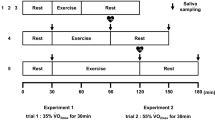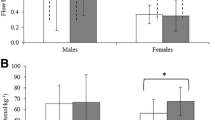Abstract
Cardiovascular activity and secretory immunoglobulin A (sIgA) in saliva were recorded at rest, during a 30-min computer game task, and during subsequent recovery. Blood pressure (BP) rose and remained elevated during the task and returned to resting levels during recovery. This pressor response was produced by increased total peripheral resistance rather than increased cardiac output. SIgA secretion rate also increased during the task, although the effect proved significant only toward the end of the task. As such, the data provide preliminary indication that sIgA is sensitive to acute psychological challenge in the laboratory. Although correlational analyses revealed that sIgA reactions were stable, they were not significantly correlated with pressor reactions. The influence of task uncertainty was explored by comparing individuals who had previously played the computer game with those who had not. Task-induced increases in BP and sIgA were a feature of individuals new to the computer game. In contrast to these novice players, experienced players showed minimal increases in BP and no increases in sIgA.
Similar content being viewed by others
References
Allen, M. T., & Patterson, S. M. (1995). Hemoconcentration and stress: A review of the physiological mechanisms and relevance for cardiovascular disease risk. Biological Psychology, 41, 1–28.
Bachen, E. A., Manuck, S. B., Cohen, S., Muldoon, M. F., Raible, R., Herben, T. B., & Rabin, B. S. (1995). Adrenergic blockade ameliorates cellular immune responses to mental stress in humans. Psychosomatic Medicine, 57, 366–372.
Benschop, R. J., Nieuwenhuis, E. E. S., Tramp, E. A. M., Godeart, G., Ballieux, R., & van Doomen, L. J. P. (1994). The effects of beta-adrenergic blockade on immunologic and cardiovascular changes induced by mental stress. Circulation, 89, 762–769.
Brandtzaeg, P., Fjellonger, I., & Gjeruldsen, S. T. (1970). Human secretory immunoglobulins. I. Salivary secretions from individuals with normal or low levels of serum immunoglobulins. Scandinavian Journal of Haematology, 12(Suppl.), 1–83.
Butler, W. T., Waldmann, T. A., Rossen, R. D., Douglas, R. G., & Couch, R. B. (1970). Changes in IgA and IgG concentrations in nasal secretions prior to the appearance of antibody during vital respiratory infection in man. Journal of Immunology, 105, 584–591.
Cacioppo, J. T. (1994). Social neurosctence: Autonomic, neuro-endocrine, and immune responses to stress, Psychophysiology, 31, 113–128.
Cacioppo, J. T., Malarkey, W. B., Kiecolt-Glaser, J. K., Uchino, B. N., Sgoutas-Emch, S. A., Sheridan, J. F., Bernston, G. G., & Glaser, R. (1995). Heterogeneity in neuroendocrine and immune responses to brief psychological stressors as a function of autonomic cardiac activation. Psychosomatic Medicine, 57, 154–164.
Carr, D. J., Woolley, T. W., & Blalock, J. E. (1992). Phentolamine but not propranolol blocks the immunopotentiating effect of cold stress on antigen-specific IgM production in mice orally immunized with sheep red blood cells. Brain, Behavior, and Immunity, 6, 50–63.
Elliott, R. (1966). Effects of uncertainty about the nature and advent of a noxious stimulus (shock) upon heart rate. Journal of Personality and Social Psychology, 3, 353–356.
Evans, P., Bristow, M., Hucklebridge, F., Clow, A., & Pang, F.-Y. (1994). Stress, arousal, Cortisol and secretory immunoglobulin A in students undergoing assessment. British Journal of Clinical Psychology, 33, 575–576.
Evans, P., Bristow, M., Hucklebridge, F., Clow, A., & Walters, N. (1993). The relationship between secretory immunity, mood and life events. British Journal of Clinical Psychology, 32, 227–236.
Evans, P., Hucklebridge, F., Clow, A., & Doyle, A. (1995). Secretory immunoglobulin A as a convenient biomarker in health survey work. In J. Rodriguez-Marin (Ed.), Health psychology and quality of life research (Vol. II, pp. 541–549). Alicante, Spain: University of Alicante Press.
Graham, N. M. H. Chiron, R., Baratholomeusz, A., Taboonpong, N., & La Brooy, J. T. (1988). Does anxiety reduce the secretion rate of secretory Ig A in saliva? The Medical Journal of Australia, 148, 131–133.
Herbert, T. B., & Cohen, S. (1993), Stress and immunity in humans: A meta-analytic review. Psychosomatic Medicine, 55, 364–379.
Herbert, T. B., Cohen, S., Marsland, A. L., Bachen, E. A., Rabin, E. S., Muldoon, M. F., & Manuck, S. B. (1994). Cardiovascular reactivity and the course of immune response to an acute psychological stressor. Psychosomatic Research, 56, 337–344.
Jemmot, J. M., & McClelland, D. C. (1989). Secretory IgA as a measure of resistance to infectious disease: Comments on Stone, Cox, Valdismarsdottir, and Neale. Behavioral Medicine, 12, 63–71.
Kubicek, W. G., Kottke, F. J., Ramos, M. V., Patterson, R. P., Labree, J. W., Remole, W., Layman, T. E., Schoening, H., & Garamela, J. T. (1974). The Minnesota impedance cardiograph—Theory and implications. Biomedical Engineering, 9, 410–417.
Kuby, J. (1994). Immunology (2nd ed.; pp. 516–517). New York: Freeman.
Light, K. C., & Obrist, P. A. (1980). Cardiovascular response to stress: Effects of opportunity to avoid shock experience and performance feedback. Psychophysiology, 17, 243–252.
Lovallo, W. R., & Wilson, M. F. (1992). A biobehavioral model of hypertension development. In J. R. Turner, A. Sherwood, & K. C. Light (Eds.), Individual differences in cardiovascular response to stress (pp. 265–280). New York: Plenum.
Manuck, S. B. (1994), Cardiovascular reactivity in cardiovascular disease: “Once more unto the breach.” International Journal of Behavioral Medicine, 1, 4–31
Manuck, S. B., Cohen, S., Rabin, B. S., Muldoon, M. F., & Bachen, E. A. (1991). Individual differences in cellular immune responses to stress. Psychological Science, 2, 111–115.
McClelland, D. C., Alexander, C., & Marks, E. (1982). The need for power, stress, immune function and illness among male prisoners. Journal of Abnormal Psychology, 91, 61–70.
McClelland, D. C., & Kirshnit, C. (1988). The effect of motivational arousal through films on salivary immunoglobulin A. Psychology and Health, 2, 31–52.
McClelland, D. C., Ross, G., & Patel, V. (1985). The effect of an academic examination on salivary norepinephrine and immunoglobulin levels. Journal of Human Stress, 11, 52–59.
Miller, S. B., & Ditto, B. (1988). Cardiovascular responses to an extended aversive video game task. Psychophysiology, 25, 200–208.
Miller, S. B., & Ditto, B. (1989). Individual differences in heart rate and peripheral vascular responses to an extended stress task. Psychophysiology, 26, 506–513.
Miller, S. B., & Ditto, B. (1991). Exaggerated sympathetic nervous system response to extended psychological stress in offspring of hypertensives. Psychophysiology, 28, 103–113.
Mills, P. J., Berry, C. C., Dimsdale, J. E., Ziegler, M. G., Nelesen, R. A., & Kennedy, B. P. (1995). Lymphocyte subset redistribution in response to acut eexperimental stress: Effects of gender, ethnicity, hypertension, and the sympathetic nervous system. Brain, Behavior, and Immunity, 9, 61–69.
Myers, J. L. (1972). Fundamentals of experimental design. Boston: Allyn & Bacon.
Turner, J. R., & Carroll, D. (1985). Heart rate and oxygen consumption during mental arithmetic, a video game and graded exercise: Further evidence of metabolically-exaggerated cardiac adjustments? Psychophysiology, 22, 261–267.
Willemsen, G. H. M., de Geus, E. J. C., Klaver, C. H. A. M., van Doornen, L. J. P., & Carroll, D. (1996). Ambulatory monitoring of the impedance cardiogram. Psychophysiology, 33, 184–193.
Zakowski, S. G., Cohen, L., Hall, M. H., Wollman, K., & Baum, A. (1994). Differential effects of active and passive laboratory stressors on immune function in healthy men. International Journal of Behavioral Medicine, 1, 163–184.
Zakowski, S. G., McAllister, C. G., Deal, M., & Baum, A. (1992). Stress, reactivity and immune function. Health Psychology, 11, 223–232.
Zeier, H., Brauchli, P., & Joller-Jemelka, H. I. (1996). Effects of work demands on immunoglobulin A and Cortisol in air traffic controllers. Biological Psychology, 42, 413–423.
Author information
Authors and Affiliations
Corresponding author
Additional information
We thank Shirley Lambert for performing the enzyme-linked immunoabsorbent (ELISA) assays.
Rights and permissions
About this article
Cite this article
Carroll, D., Ring, C., Shrimpton, J. et al. Secretory immunoglobulin a and cardiovascular responses to acute psychological challenge. Int. J. Behav. Med. 3, 266–279 (1996). https://doi.org/10.1207/s15327558ijbm0303_6
Issue Date:
DOI: https://doi.org/10.1207/s15327558ijbm0303_6




